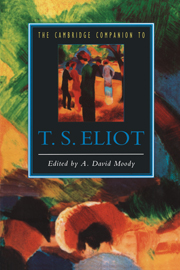Book contents
- Frontmatter
- 1 Where is the real T. S. Eliot? or, The Life of the Poet
- 2 Eliot as a product of America
- 3 Eliot as philosopher
- 4 T. S. Eliot's critical program
- 5 The social critic and his discontents
- 6 Religion, literature, and society in the work of T. S. Eliot
- 7 “England and nowhere”
- 8 Early poems
- 9 Improper desire
- 10 Ash-Wednesday
- 11 Four Quartets
- 12 Pereira and after
- 13 “Mature poets steal”
- 14 Eliot's impact on twentieth-century Anglo-American poetry
- 15 Tradition and T. S. Eliot
- 16 Eliot
- 17 Eliot studies
- A Select Booklist
- Index
11 - Four Quartets
music, word, meaning and value
Published online by Cambridge University Press: 28 May 2006
- Frontmatter
- 1 Where is the real T. S. Eliot? or, The Life of the Poet
- 2 Eliot as a product of America
- 3 Eliot as philosopher
- 4 T. S. Eliot's critical program
- 5 The social critic and his discontents
- 6 Religion, literature, and society in the work of T. S. Eliot
- 7 “England and nowhere”
- 8 Early poems
- 9 Improper desire
- 10 Ash-Wednesday
- 11 Four Quartets
- 12 Pereira and after
- 13 “Mature poets steal”
- 14 Eliot's impact on twentieth-century Anglo-American poetry
- 15 Tradition and T. S. Eliot
- 16 Eliot
- 17 Eliot studies
- A Select Booklist
- Index
Summary
From the start we are teased into thought. The compact title plays upon severalness and singularity: four works, and yet one work. Not just four works either, but four to the power of their four instruments; and still the title declares them to be a single work. Further, the title declares the words on the pages before us to be musical compositions, like those of Haydn or Beethoven or Bartok. What then are the instruments of these “quartets” which are actually composed of words? And are they truly written in quartet-form? Thus the title proposes its own questions and perspectives. Over the first half-century of the poem's life these have provided the most appropriate and rewarding approaches, and they are still the ones to start out from. They will lead us to other and more problematic questions as we discover the meanings and values generated in the verbal music and are confronted by Eliot's radical revaluations of nature and human society and history. Meaning itself, we gather, is merely instrumental: what matters is what the poem can do in the way of altering our values and redirecting our desires. But then is it conceivable that one could love and love no-one and no thing, as the poem would have us do?
- Type
- Chapter
- Information
- The Cambridge Companion to T. S. Eliot , pp. 142 - 157Publisher: Cambridge University PressPrint publication year: 1994
- 2
- Cited by

